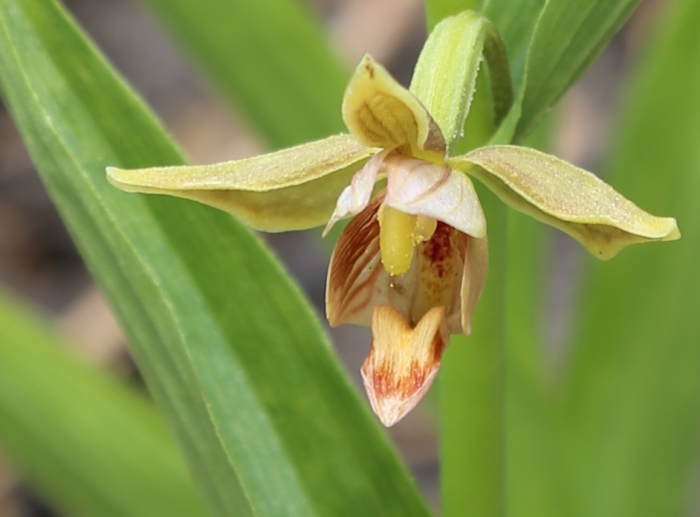Stream Orchid
(Epipactis gigantea)
Stream Orchid (Epipactis gigantea)
/
/

Dcrjsr
CC BY 4.0
Image By:
Dcrjsr
Recorded By:
Copyright:
CC BY 4.0
Copyright Notice:
Photo by: Dcrjsr | License Type: CC BY 4.0 | License URL: https://creativecommons.org/licenses/by/4.0 | Uploader: Dcrjsr | Publisher: Wikimedia Commons | Title: Epipactis_gigantea_flower_closeup.jpg | Notes: {{User:Jnn/C |De= |Ja=兵庫県立フラワーセンター |De2= |Date=2007 |otherVer= |img= |imginfo= |cam=31 }} [[Category:Hyogo Prefectural Flower center]] |



























































Estimated Native Range
Summary
Epipactis gigantea, commonly known as Stream Orchid, is a deciduous perennial herb native to moist meadows, seeps, springs, and streambanks in the Western and Intermountain regions of the USA and Mexico. This species typically grows from 30 centimeters to one meter in height and is characterized by its erect form. The stems bear prominently-veined, wide or narrow lance-shaped leaves that are 5 to 15 centimeters long. The Stream Orchid produces inflorescences of two or three showy flowers near the top, each with three straight sepals that are light brownish or greenish with darker veining, and each one to two centimeters long. The two upper petals are similar in shape and reddish-brown with purple veins, while the lower petal is cup-shaped with a pointed, tongue-like protuberance, displaying a brighter red-brown color with stark veining and often areas of yellow. The fruit is a hanging capsule 2 or 3 centimeters long, containing thousands of tiny seeds.
The Stream Orchid is valued for its striking flowers, which bloom from late spring to early summer, adding a touch of elegance to moist garden areas. It is often used in naturalistic plantings, such as in rain gardens or near water features, where its high water needs can be met. The plant prefers part shade to full sun and thrives in soils with slow drainage, mimicking its natural riparian habitat. While it is generally low-maintenance, it can be susceptible to drought stress if not provided with adequate moisture. Stream Orchid is not commonly known for aggressive roots or serious disease problems, but it may require protection from slugs and snails, which find its foliage attractive.CC BY-SA 4.0
The Stream Orchid is valued for its striking flowers, which bloom from late spring to early summer, adding a touch of elegance to moist garden areas. It is often used in naturalistic plantings, such as in rain gardens or near water features, where its high water needs can be met. The plant prefers part shade to full sun and thrives in soils with slow drainage, mimicking its natural riparian habitat. While it is generally low-maintenance, it can be susceptible to drought stress if not provided with adequate moisture. Stream Orchid is not commonly known for aggressive roots or serious disease problems, but it may require protection from slugs and snails, which find its foliage attractive.CC BY-SA 4.0
Plant Description
- Plant Type: Herb
- Height: 1-3 feet
- Width: 2.5-6 feet
- Growth Rate: Moderate
- Flower Color: Brown, Cream, Green, Orange, Red, Yellow
- Flowering Season: Spring, Summer
- Leaf Retention: Deciduous
Growth Requirements
- Sun: Full Sun, Part Shade
- Water: High
- Drainage: Slow
Common Uses
Bee Garden, Bird Garden, Butterfly Garden, Deer Resistant, Rock Garden, Showy Flowers, Water Garden
Natural Habitat
Moist meadows, seeps, springs, and streambanks in the Western and Intermountain regions of the USA and Mexico
Other Names
Common Names: Giant Helleborine , Chatterbox , Heleborina Gigante , Épipactis Géant
Scientific Names: Epipactis gigantea , Serapias gigantea , Epipactis pringlei , Amesia gigantea , Arthrochilium giganteum , Epipactis americana , Cephalanthera kokanica , Cephalanthera royleana , Epipactis gigantea f. rubrifolia , Helleborine gigantea
GBIF Accepted Name: Epipactis gigantea Douglas ex Hook.